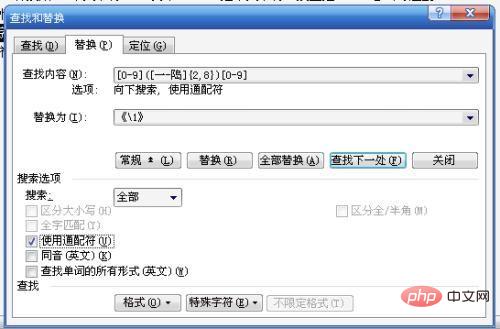What do the wildcard characters * and ? mean when searching for files?
The wildcard "*" can represent any string and can match zero, single or multiple characters; while the wildcard "?" only represents a single string, and this word must exist. Wildcard is a special statement, mainly including asterisk "*" and question mark "?", used to fuzzy search files; the number of matches for "*" is not limited, while the number of matching characters for "?" is limited. When looking for a folder, you can use it to replace one or more real characters; when you don't know the real characters or you are too lazy to enter the full name, you often use wildcards to replace one or more real characters.

The operating environment of this tutorial: Windows 7 system, Dell G3 computer.
When searching for files, the wildcard character * can represent any string; ? only represents a single string, but this word must exist.
Wildcard is a special statement, mainly asterisk (*) and question mark (?), used to fuzzy search files. When looking for a folder, you can use it to replace one or more real characters; when you don't know the real characters or you are too lazy to enter the full name, you often use wildcards to replace one or more real characters.
In fact, "*Not?pad" can correspond to Notepad and MyNotepad; Notep[ao]d can correspond to Notepad and Notepod [ao represents one of a and o], and the rest And so on.

The difference between wildcard characters "*" and "?"
"*" can be used to replace zero, single or multiple characters, while "?" can only be used in place of one character. "*" means that the number of matches is unlimited, while "?" means that the number of matching characters is limited.
This technique is mainly used in English searches. For example, if you enter ""computer*", you can find words such as "computer, computers, computerised, computerized", and if you enter "comp?ter", you can only find Words such as "computer, computer, computer".
Extended information:
How to use wildcards - summation of fuzzy conditions:
1. For example Requirement: Find the total quantity of "T-shirts" included in the product
You need to sum up the total quantity of T-shirts in the item column, enter the formula: =SUMIF(A2:A18,"*T-shirt* ",D2:D18) Because we are not sure whether there is other data before and after "T-shirt", so the condition is "*T-shirt*", then we can find the quantity of all the numbers containing "T-shirt".
2. For example, ask: Find the total quantity corresponding to the last word in the product is "skirt", and the cell is 5 characters
Enter the formula in the item column: =SUMIF(A2:A18," ????skirt", D2:D18), because it must be 5 characters and the last one is "skirt", so the condition input "????skirt" 1 "? "Represents any 1 character.
For more related knowledge, please visit the FAQ column!
The above is the detailed content of What do the wildcard characters * and ? mean when searching for files?. For more information, please follow other related articles on the PHP Chinese website!

Hot AI Tools

Undresser.AI Undress
AI-powered app for creating realistic nude photos

AI Clothes Remover
Online AI tool for removing clothes from photos.

Undress AI Tool
Undress images for free

Clothoff.io
AI clothes remover

Video Face Swap
Swap faces in any video effortlessly with our completely free AI face swap tool!

Hot Article

Hot Tools

Notepad++7.3.1
Easy-to-use and free code editor

SublimeText3 Chinese version
Chinese version, very easy to use

Zend Studio 13.0.1
Powerful PHP integrated development environment

Dreamweaver CS6
Visual web development tools

SublimeText3 Mac version
God-level code editing software (SublimeText3)

Hot Topics
 1386
1386
 52
52
 What are the oracle wildcards?
Nov 08, 2023 am 10:02 AM
What are the oracle wildcards?
Nov 08, 2023 am 10:02 AM
Oracle wildcard characters include "%", "_", "[]" and "[^]". Detailed introduction: 1. The wildcard character "%" means matching any character, including zero characters. Using the wildcard character "%" in Oracle can implement fuzzy query. When the wildcard character "%" is used in the query statement, the query will return all characters matching the specified character. Pattern matching string; 2. The wildcard character "_" means matching any single character. In Oracle, the wildcard character "_" can be used to achieve exact matching. When using wildcard characters in query statements, etc.
 What are the regular expression wildcards?
Nov 17, 2023 pm 01:40 PM
What are the regular expression wildcards?
Nov 17, 2023 pm 01:40 PM
Regular expression wildcards include ".", "*", "+", "?", "^", "$", "[]", "[^]", "[a-z]", "[A-Z] ","[0-9]","\d","\D","\w","\W","\s&quo
 What do the wildcard characters * and ? mean when searching for files?
Jul 25, 2022 am 11:43 AM
What do the wildcard characters * and ? mean when searching for files?
Jul 25, 2022 am 11:43 AM
The wildcard character "*" can represent any string and can match zero, single or multiple characters; while the wildcard character "?" only represents a single string, and this word must exist. Wildcard is a special statement, mainly including asterisk "*" and question mark "?", used to fuzzy search files; the number of matches for "*" is not limited, while the number of matching characters for "?" is limited. When looking for a folder, you can use it to replace one or more real characters; when you don't know the real characters or you are too lazy to enter the full name, you often use wildcards to replace one or more real characters.
 What is the difference between wildcard characters * and ?
Aug 11, 2023 pm 01:20 PM
What is the difference between wildcard characters * and ?
Aug 11, 2023 pm 01:20 PM
The wildcards * and ? have some differences in usage and matching range. Specific differences: 1. In terms of matching range, the wildcard * can match any length of character sequence, including letters, numbers, punctuation marks, spaces, etc., while the wildcard ? can only match one character; 2. In terms of usage, the wildcard * is used Fuzzy matching can match multiple characters or character sequences. The wildcard character ? is used for exact matching and can only match one character.
 What are the wildcard characters in word?
Jan 22, 2024 pm 04:03 PM
What are the wildcard characters in word?
Jan 22, 2024 pm 04:03 PM
Word wildcard characters include "?", "*", "[]", "!", "%", etc. Detailed introduction: 1. Question mark (?): indicates matching any single character. For example, "c?t" can match words such as "cat" and "cut"; 2. Asterisk (*): indicates matching zero or more characters. For example, "colr" can match words such as "color" and "colour"; 3. Square brackets ([]): means matching any character within the square brackets. For example, "[aeiou]" can match any vowel; 4. exclamation point, etc.
 Learn from scratch: Master wildcards in Linux commands
Mar 16, 2024 pm 12:18 PM
Learn from scratch: Master wildcards in Linux commands
Mar 16, 2024 pm 12:18 PM
Learn from scratch: Master wildcard characters in Linux commands In Linux systems, wildcard characters are special characters used to match file names. Mastering these wildcards can help us locate and operate files on the command line more efficiently. This article will focus on several commonly used Linux wildcard characters, with specific code examples, hoping to help beginners better understand and use these wildcard characters. 1. Asterisk (*) The asterisk wildcard represents zero or more arbitrary characters and can match any long string. Here is an example: ls
 Generic wildcards in Java functions: upper and lower bounds
Apr 25, 2024 pm 04:18 PM
Generic wildcards in Java functions: upper and lower bounds
Apr 25, 2024 pm 04:18 PM
In Java, generic wildcards allow generic types to be represented without specifying concrete types. Upper limit wildcard (
 Common CSS selector wildcard examples to master
Dec 26, 2023 am 09:00 AM
Common CSS selector wildcard examples to master
Dec 26, 2023 am 09:00 AM
To master common CSS selector wildcard examples, specific code examples are required. CSS selectors are a very important part of web development. They allow us to select and style HTML elements based on different element attributes. Among CSS selectors, wildcards are a very useful selector that can match any type of HTML element. In this article, we will introduce commonly used CSS wildcards and provide specific code examples. Wildcard (*) The wildcard "*" represents selecting all HTML elements. It can be used to set all



